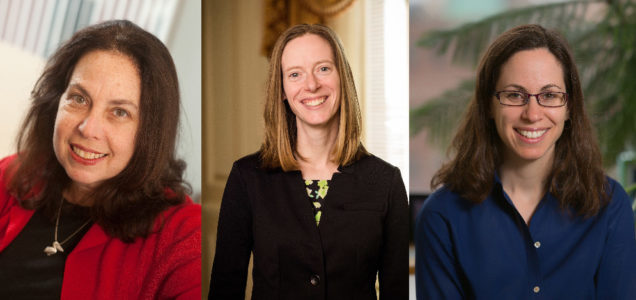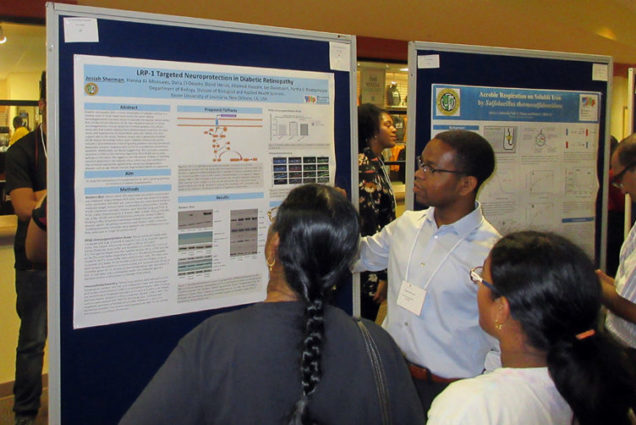BU Promotes Diversity in STEM Fields with NSF Grants

As part of its mission to bring greater diversity to the nation’s scientific workforce, the National Science Foundation (NSF) recently awarded a two-year $300,000 grant to the School of Medicine to engage undergraduate students from underrepresented minorities and other disadvantaged groups in exploring career opportunities in science, technology, engineering, and mathematics (STEM) outside of medicine. Linda Hyman, associate provost for MED’s Division of Graduate Medical Sciences and the principal investigator on the NSF grant, says such grants are needed because a great many students from underrepresented groups are unaware of opportunities in academia, the biotechnology and pharmaceutical industries, science communication, science policy, and technology/patent law.
MED was one of 27 institutions to receive the award through the NSF’s two-year-old Inclusion across the Nation of Communities of Learners of Underrepresented Discoverers in Engineering and Science (INCLUDES) program, which is aimed at enhancing leadership in STEM discoveries and innovations through diversity and inclusion.
“The critical contributions of a diverse and inclusive community are essential to progress in all STEM fields,” says Hyman, who is a MED professor of microbiology. “By promoting diversity in education, we hope to engage undergraduate students at a point in their professional development that could enable participation in a wide range of workforce opportunities, so as to advance the progress of science and national health. The underlying premise is that career exploration focused on opportunities that go beyond physician training will enable engagement of this community of learners in the life sciences network beyond the premed track, and keep them engaged in degree completion.”
Hyman is co–principal investigator with Barbara Schreiber, a MED associate professor of biochemistry, of BU’s National Institutes of Health–funded Broadening Experiences in Scientific Training (BEST) program, which is aimed at helping postdocs and grad students explore STEM careers outside of medicine. With the INCLUDES grant, BU will lead a network of four other BEST research institutions—Cornell University, Wayne State University, the University of Colorado, Denver, and the University of North Carolina at Chapel Hill—in helping undergraduate students from four selected schools with large numbers of underrepresented minorities to explore careers in STEM. Those schools are the University of Massachusetts, Lowell, which has many socioeconomically disadvantaged, first-generation college students; two historically black colleges—Shaw University, in North Carolina, and Xavier University of Louisiana; and the University of Puerto Rico at Carolina. These schools’ students will be invited to visit BU and the other BEST institutions to get hands-on experience in labs and meet and shadow scientists in academia and industry. They will also be offered help in applying to graduate school.
Many students at UMass Lowell are interested in the life sciences and have aspirations of working in the region’s biotech industry, says Matthew A. Nugent, UMass Lowell’s Kennedy College of Sciences associate dean for research, innovation, and partnerships. But, Nugent says, few students know anything about what these jobs—or any jobs in research—entail.
“These are students who are smart and eager to work hard, but they don’t have the social capital to even know that this is a thing,” he says. “I meet students on a one-to-one basis and their eyes are opened when I tell them that people in PhD programs actually get paid and get free tuition. We have really dedicated faculty, but each of them might have 30 or 40 advisees, and they’re teaching classes, and they’re trying to do research. They can’t create 20 student research projects.”
The new BU BEST NSF–funded project—called BEST BET, for Beginning Enhancement Track—is an opportunity to expose UMass Lowell undergraduates to “what the research experience is, what a PhD student is,” Nugent says. “It’s not just going to classes—it’s doing real stuff.”
At Xavier University of Louisiana, Kelly Johanson, an associate professor of chemistry, is part of a faculty team working to engage undergraduates from diverse backgrounds in exploring biomedical research careers through a national, NIH-funded Building Infrastructure Leading to Diversity (BUILD) initiative. Xavier, which already partners with BU through BUILD and BU’s BEST BET, will offer additional opportunities for Xavier students to learn firsthand about research careers, says Johanson.

“What’s nice about BU’s BEST BET is that it exposes students to different types of careers other than just traditional professor,” she says. “We have students who are interested in biomedical research, but we don’t have much of that down here. We don’t have somewhere down the street to show them: this is what you can do, these are the possibilities.”
In addition to the INCLUDES grant, BU has received two NSF awards to promote diversity in STEM fields. The University is one of nine institutions sharing a five-year, $2 million Alliances for Graduate Education and the Professoriate (AGEP) grant to study and improve pathways to STEM careers for students, postdocs, and faculty who are underrepresented minorities and from other disadvantaged groups. BU’s portion of the grant amounts to $174,000 over five years.
Iowa State University will lead the AGEP grant. The other seven are Cornell, Howard University, Northwestern University, University of Georgia, University of Buffalo, University of Texas, and University of Maryland, College Park. These institutions, as well as BU, are all members of the Center for the Integration of Research, Teaching, and Learning (CIRTL), a consortium of 43 research universities committed to preparing the next generation of STEM faculty.
Sarah Hokanson (CAS’05), BU director of professional development and postdoctoral affairs, is the principal investigator on the AGEP grant for BU.
“Ensuring that the next generation of faculty fully reflects the diversity in race, gender, culture, and intellectual talent across the United States is an important challenge facing all of higher education,” says Hokanson. “Being a part of the CIRTL AGEP alliance is an exciting opportunity for BU to partner with our peers to strengthen the mentoring relationships between faculty and trainees, improving our research and teaching climates and retaining graduate students and postdoctoral scholars in the academic pipeline.”
Other current BU initiatives aimed at engaging underrepresented students include a project run by Pamela Templer, a College of Arts & Sciences professor of biology, with other CAS and School of Public Health faculty. Templer is the principal investigator on a $3 million, five-year NSF Research Traineeship (NRT) grant to train graduate students from the interdisciplinary PhD programs in biogeoscience at the Graduate School of Arts & Sciences and in environmental health at SPH—with a push to target students from underrepresented groups—in tackling some of the major environmental challenges facing cities. Lucy Hutyra, a CAS associate professor of earth and environment, and Jonathan Levy, an SPH professor of environmental health, are co–principal investigators on the NRT grant.
This BU Today story was written by Sara Rimer.